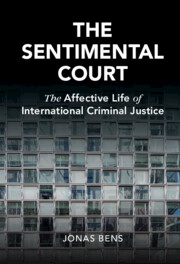‘This book constitutes a major work in the study of legal anthropology and, at the same time, a key contribution to current debates in the interrelated fields of affective politics and the anthropological study of emotions … Bens offers an original and innovative approach that reverses common assumptions, and it reforms and transforms our possibilities of thinking about law and legal processes differently, in a promising and productive manner – as emotionally charged, affectively framed, and contested. This is a thoroughly worked, wide-ranging, and impressive piece of scholarship that weaves together ethnography, legal theory, and a condensed re-reading of the history of legal anthropology, while navigating with deep knowledge and brilliant lucidity the current and recent debates in related fields.’
Kai Kresse - S-Professor and Vice Director of the Leibniz-Zentrum Moderner Orient (ZMO), Freie Universität Berlin
‘In The Sentimental Court, Jonas Bens shines an entirely new light on the ICC and its trials. He shows how aspects of trials that have felt awkward or out of place, strategies of transitional justice at odds with the law’s supposed dispassion, and even our feelings as researchers, witnesses, or spectators – all of these are, in fact, fundamental to the workings of international criminal justice. A revelatory book.’
Adam Branch - Professor in International Politics and the Director of the Centre of African Studies, University of Cambridge
‘The Sentimental Court is a thoughtful deliberation on the emotional dimensions of international criminal justice, with special emphasis on Northern Uganda and the trial of Dominic Ongwen. Affect, while officially abjured in the adjudication of international crimes, is at the heart of the legal endeavor. By paying close attention to sentiment, Jonas Bens provides crucial insights into why transitional justice succeeds or fails.’
Richard Ashby Wilson - Associate Dean of Research, University of Connecticut School of Law
‘In The Sentimental Court, Jonas Bens offers a brilliantly eloquent detailing of the affective life of international criminal justice through this innovative ethnography about the Court and its connections to other sites of justice making. From a person entering the ICC and clearing the security check, to the examination of the constructed narratives of the prosecutor, the victim’s representative, and the feelings that such encounters conjure, he offers a deterritorialized mapping of the International Criminal Court’s Dominic Ongwen case to show the way that justice atmospheres are sentimentalized in mass-atrocity violence contexts. Not only is the ethnography a wonderful must-read, but it offers precious insights into the wildly complex and unfinished results of the postcolonial condition. With passionate insights about the complexities of justice, Bens clarifies the affective spaces and the fierce stronghold of transnational globalized legal processes in the contemporary period.’
Kamari Maxine Clarke - Distinguished Professor of Transnational Justice and Sociolegal Studies at the University of Toronto
‘The author succeeds well in convincing readers that emotions and affects are not excluded from the realm of law but, on the contrary, are actively mobilized to advance plausibility, objectivity, and normative claims.’
Ingo Rohrer
Source: Anthropos
‘This book makes a timely and original intervention in the study of international criminal justice. … a unique and much-needed contribution to our understanding of how affect and emotion can influence the work of, as well as our reactions to, the ICC.’
Jacqueline R. McAllister
Source: African Studies Review
‘An important and timely contribution to socio-legal scholarship.’
Florian Grisel
Source: Frontiers of Socio-Legal Studies



